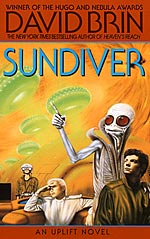
![]() Tar Daddoo
Tar Daddoo
12/28/2014
![]()
What is the Science Fiction Premise?
Although Sundiver is the first book of the Uplift trilogy, it is difficult to argue that Uplift -- the technological improvement of a species to introduce intelligent thought -- is the central premise. Uplift is discussed fully in later novels, but is rather peripheral in Sundiver.
There are many Science Fiction ideas in Sundiver, including space travel and genetic manipulation, which are accepted without much explanation. The three Science Fiction Premises that are explored most deeply are the nature of the galactic civilization, the requirements of solar exploration, and the investigation of a solar being.
Is the science of the premise explored?
Most of the Science in Sundiver is focused on solar exploration and the prospect of solar beings. We are offered a design for a ship that can travel into the outer layer of the Sun. The Science behind this is a bit fanciful, but the discussion of the challenge seems quite accurate. As for the solar beings, we encounter them as an odd structure within the Sun. The theory behind the structures is unclear, but the challenge of determining whether they are beings is interesting.
As for the galactic civilization, we learn that Earth was discovered by other more scientifically-advanced cultures. These cultures all practice Uplift and have a collection of rules and beliefs based on this practice. In particular, there is a notion of species parentage with each species owing some allegiance to the one that lifted it up. Humans are only beginning to engage in Uplift with dolphins and chimpanzees. Interestingly, humans appear to be an anomaly in that they have achieved Uplift without the intervention of another species.
Is the impact of the premise on an individual explored?
We follow Jacob Alvarez, an Uplift specialist who has been working with dolphins, as he is invited to help unravel some mysteries surrounding a research exploration of the Sun. This brings him into contact with several galactics -- species from other galactic civilizations -- and the humans who are engaged in the research.
Jacob's experience's are more like the unraveling of a mystery than an opportunity for growth or change. Through him, we learn about the galactic civilization, solar exploration, and the solar beings.
Is the impact of the premise on society explored?
The book is more a description of the galactic civilization and Earth's role in it. Insofar as Earth was affected, that is mostly in the past.
How well written is the story?
I am not sure why, but I had difficulty enjoying this book. The writing is reasonably good, though the author sometimes changes the focal character -- the one whose thoughts we can hear -- without warning.
One of my reasons for disliking the book is that the love affair is too accelerated, rather predictable, and generally uninteresting. It almost feels like an obligatory aspect of the book. I question whether the author even loved his love interest.
Another reason is that the author has not woven his Science Fiction ideas into the story. They are there, sitting at the side, facts for the detective, but not an obvious influence on anyone's actions.
Perhaps the biggest problem is that the mystery is tied into the behavior of the galactics, which are mostly unfamiliar and inscrutable. Insofar as appreciation of the mystery relies on comprehending the incomprehensible, the reader has no hope of solving the mystery until told what happened. This is not how I like to read a mystery.
Can I recommend the book?
I have difficulty recommending this book for any reason other than as a stepping stone to the later novels in the series. I have read the next book, Startide Rising, which is quite good. It is easily understandable without reading Sundiver, but you will always wonder whether you missed something. (You didn't.) Frankly, if the later novels did not exist, I would say skip this one.